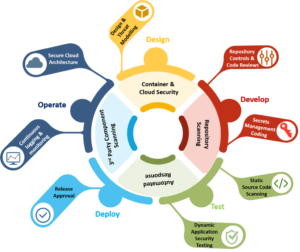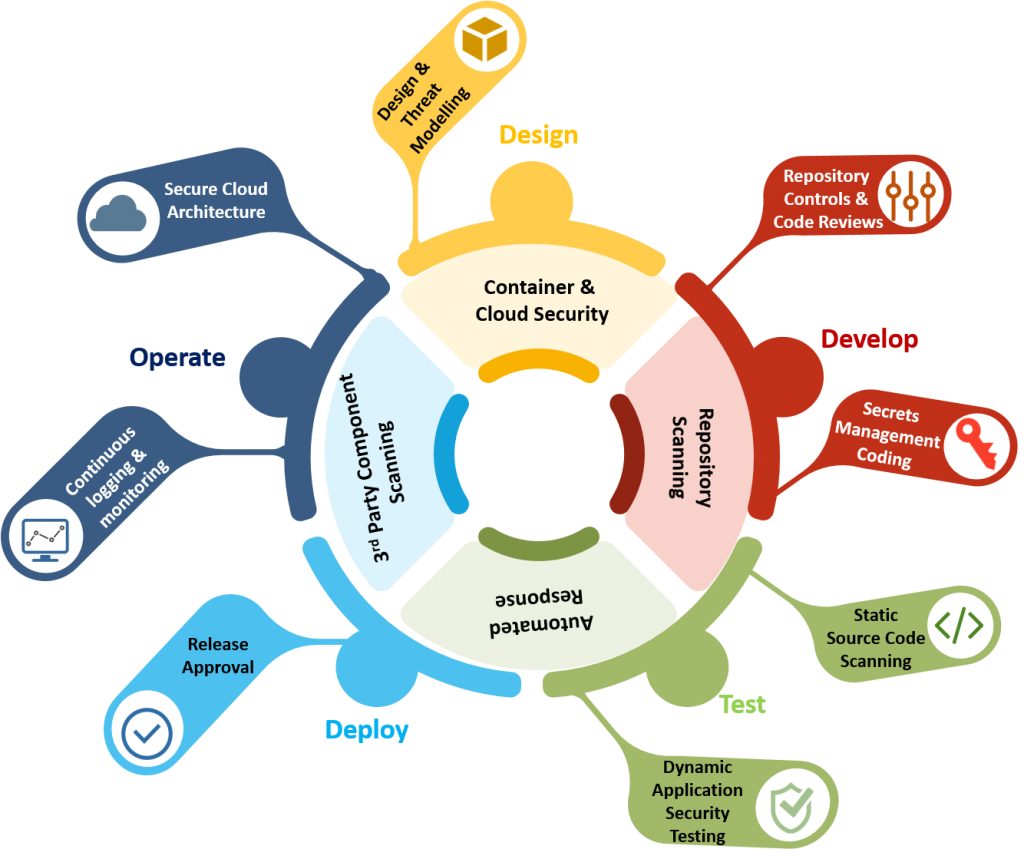DevSecOps is a software development methodology that emphasizes the integration of security into DevOps processes. It involves collaboration between development, operations, and security teams to ensure that security is a priority throughout the software development lifecycle.
DevSecOps is a software development methodology that emphasizes the integration of security into DevOps processes. It involves collaboration between development, operations, and security teams to ensure that security is a priority throughout the software development lifecycle.
Importance of DevSecOps in modern software development
The increasing frequency and sophistication of cyber attacks have made security a critical concern for software development organizations. DevSecOps helps to address this concern by providing a proactive approach to security that integrates security into the software development process from the outset.
Key principles of DevSecOps
The key principles of DevSecOps include shifting security left, integrating security into the development process, automating security testing, using cloud-based security services, and fostering collaboration and communication between all stakeholders.

Challenges in Implementing DevSecOps
-
Cultural challenges
Implementing DevSecOps requires a cultural shift within an organization to prioritize security and encourage collaboration and communication between development, operations, and security teams. This can be a significant challenge, especially in organizations with siloed teams and rigid hierarchies.
-
Integration challenges
Integrating security into DevOps processes can be challenging due to the complexity of modern software development environments, including the use of containers, microservices, and cloud-based platforms.
-
Toolchain challenges
DevSecOps requires the use of a range of security tools and technologies, and integrating these tools into the DevOps toolchain can be challenging, especially in organizations with legacy systems and processes.
-
Skills gap
Implementing DevSecOps requires a range of skills, including security expertise, automation skills, and collaboration and communication skills. Finding and retaining employees with these skills can be challenging for many organizations.
Best Practices for Integrating Security into DevOps Processes
-
Shift left security
The principle of shifting security left involves integrating security into the software development process as early as possible. This includes conducting security testing during development and using secure coding practices.
-
Implement security as code
Implementing security as code involves creating security policies and procedures as code that can be incorporated into the development process. This helps to ensure that security is built into the software from the outset and can be automated for greater efficiency.
-
Automate security testing
Automating security testing helps to ensure that security testing is conducted consistently and efficiently throughout the software development lifecycle. This includes the use of static code analysis, dynamic application security testing, and penetration testing.
-
Use cloud-based security services
Cloud-based security services offer a range of benefits for DevSecOps, including scalability, flexibility, and ease of integration. These services include security information and event management (SIEM), identity and access management (IAM), and vulnerability management.
-
Conduct regular security training and awareness programs
Regular security training and awareness programs help to ensure that all stakeholders understand their role in maintaining security throughout the software development process. This includes developers, operations staff, and security personnel.
-
Collaborate and communicate with all stakeholders
Effective collaboration and communication between development, operations, and security teams are critical to the success of DevSecOps. This includes regular meetings, open communication channels, and shared metrics and goals.
Benefits of Implementing DevSecOps
-
Improved security
Integrating security into DevOps processes helps to improve the overall security of software by making security a priority throughout the development process.
-
Faster time to market
DevSecOps helps to reduce the time it takes to bring software to market by integrating security into the development process and automating security testing.
-
Increased efficiency and productivity
By automating security testing and integrating security into the development process, DevSecOps helps to improve efficiency and productivity throughout the software development lifecycle.
-
Enhanced customer trust and loyalty
Implementing DevSecOps practices can lead to increased customer trust and loyalty. With security integrated into the development process, customers can be confident that their data is being handled securely. This can help to build trust with customers and improve brand reputation.
Tools and Technologies for DevSecOps
There are many tools and technologies available to help organizations implement DevSecOps practices. These tools range from open-source security tools to commercial security tools and cloud-based security services. Some popular tools and technologies include:
-
Open-source security tools
There are many open-source security tools available that can help with DevSecOps. These tools include software for vulnerability scanning, penetration testing, and code analysis.
-
Commercial security tools
Commercial security tools can also be used to implement DevSecOps practices. These tools often provide more advanced features and support than open-source tools. They include tools for vulnerability management, threat detection, and incident response.
-
Cloud-based security services
Many cloud service providers offer security services that can be integrated into DevSecOps processes. These services include identity and access management, data encryption, and network security.
Future Trends in DevSecOps
It is a constantly evolving field, and several trends are likely to shape its future. Some of these trends include:
-
Increased adoption of DevSecOps
As more organizations recognize the importance of security in the software development process, the adoption of DevSecOps is likely to increase. This will lead to a greater emphasis on security throughout the software development lifecycle.
-
Integration of artificial intelligence and machine learning
Artificial intelligence and machine learning are likely to play a larger role in DevSecOps. These technologies can be used to automate security testing and analysis and to identify security threats more quickly and accurately.
-
The continued evolution of open-source security tools
Open-source security tools will likely continue to evolve and improve, providing more advanced features and greater support for DevSecOps practices.
Conclusion
DevSecOps is a critical approach to modern software development that prioritizes security throughout the development process. By implementing best practices such as shifting left security, automating security testing, and collaborating with all stakeholders, organizations can improve their security posture while increasing efficiency and productivity. As the field of DevSecOps continues to evolve, organizations need to stay up to date with the latest trends and technologies to maintain a strong security posture.
Secure your software development process with Tanbits DevSecOps approach. By prioritizing security from the start, automating security testing, and collaborating with all stakeholders, our approach helps improve your security posture while increasing efficiency and productivity. Stay ahead of the curve by adopting the latest trends and technologies with us.











